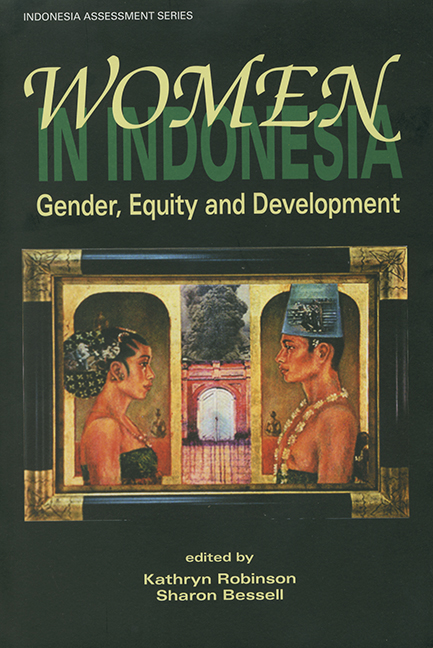Book contents
- Frontmatter
- Contents
- Tables
- Figures
- Contributors
- Acknowledgments
- Glossary
- Prologue
- 1 Introduction to the Issues
- 2 The Mega Factor in Indonesian Politics: A New President or a New Kind of Presidency?
- 3 The Downfall of President Abdurrahman Wahid: A Return to Authoritarianism?
- 4 The Year in Review: From Blind Man's Bluff to Mega Expectations
- 5 Further Comments on the Economy, with a Gender Perspective
- 6 Institution Building: An Effort to Improve Indonesian Women's Role and Status
- Commentary
- 7 Feminism in Indonesia in an International Context
- 8 Gay and Lesbi Subjectivities, National Belonging and the New Indonesia
- 9 And the Winner Is … Indonesian Women in Public Life
- 10 Indonesian Women Artists: Transcending Compliance
- 11 Literature, Mythology and Regime Change: Some Observations on Recent Indonesian Women's Writing
- 12 Women and the Labour Market during and after the Crisis
- 13 Women's International Labour Migration
- 14 Customary Institutions, Syariah Law and the Marginalisation of Indonesian Women
- 15 Women's Grassroots Movements in Indonesia: A Case Study of the PKK and Islamic Women's Organisations
- 16 Women's Activism against Violence in South Sulawesi
- 17 Gender Mainstreaming and Sex-disaggregated Data
- 18 The Changing Indonesian Household
- 19 Women, Family Planning and Decentralisation: New Variations on Old Themes
- 20 Men, Women and Community Development in East Nusa Tenggara
- References
- Index
- INDONESIA ASSESSMENT SERIES
11 - Literature, Mythology and Regime Change: Some Observations on Recent Indonesian Women's Writing
Published online by Cambridge University Press: 21 October 2015
- Frontmatter
- Contents
- Tables
- Figures
- Contributors
- Acknowledgments
- Glossary
- Prologue
- 1 Introduction to the Issues
- 2 The Mega Factor in Indonesian Politics: A New President or a New Kind of Presidency?
- 3 The Downfall of President Abdurrahman Wahid: A Return to Authoritarianism?
- 4 The Year in Review: From Blind Man's Bluff to Mega Expectations
- 5 Further Comments on the Economy, with a Gender Perspective
- 6 Institution Building: An Effort to Improve Indonesian Women's Role and Status
- Commentary
- 7 Feminism in Indonesia in an International Context
- 8 Gay and Lesbi Subjectivities, National Belonging and the New Indonesia
- 9 And the Winner Is … Indonesian Women in Public Life
- 10 Indonesian Women Artists: Transcending Compliance
- 11 Literature, Mythology and Regime Change: Some Observations on Recent Indonesian Women's Writing
- 12 Women and the Labour Market during and after the Crisis
- 13 Women's International Labour Migration
- 14 Customary Institutions, Syariah Law and the Marginalisation of Indonesian Women
- 15 Women's Grassroots Movements in Indonesia: A Case Study of the PKK and Islamic Women's Organisations
- 16 Women's Activism against Violence in South Sulawesi
- 17 Gender Mainstreaming and Sex-disaggregated Data
- 18 The Changing Indonesian Household
- 19 Women, Family Planning and Decentralisation: New Variations on Old Themes
- 20 Men, Women and Community Development in East Nusa Tenggara
- References
- Index
- INDONESIA ASSESSMENT SERIES
Summary
The dramatic political changes of the last few years in Indonesia undoubtedly have been significant for women. The dismantling of New Order political structures and ideologies has opened up space for varied forms of women's activism. Women's groups have addressed, with enhanced solidarity and agency, problems of economic hardship and political unrest. The horrific rapes of May 1998 and exposure of similar events in regions of military conflict have made violence against women an issue of serious public concern and institutional activity. But the overall effects of change are still unclear. The revival of conservative customary law, particularly Islamic law, as part of new regional autonomy measures is seen as potentially repressive for women (see Noerdin, Chapter 14). Violence against women continues. One might question how developments in the public, political sphere have affected the daily practice of women's lives, and what impact the events of a mere few years might have had on patterns of gender inequality and accompanying ideological assumptions entrenched over centuries.
When and if deep-seated change occurs, a key site of its expression is likely to be cultural forms and the mass media. Numerous studies of New Order cultural expression document the ways in which the conservative, family-centred gender ideology of the regime was reproduced in and reinforced through literary works, magazines, film, television and other media. Through direct government control in the case of state-owned media and a more diffuse reflection of dominant discourse elsewhere, women's roles as male-dependent wives and mothers were valorised, and more autonomous female behaviour queried and criticised (Sen 1982, 1993; Sunindyo 1993; Hatley 1997; Brenner 1999). Such imagery fitted the regime's propagation of an organic model of the state as hierarchically ordered family. Its striking prominence in government propaganda and media is explained by Susan Brenner (1999: 30) as a deflection of attention away from ‘real crises of citizenship’, wealth inequalities, corruption and ethnic tensions, towards national narratives of moral crisis in the family in which ‘the happy middle class family came to stand for a generic Indonesian moral and social order’.
Such practices built upon and developed strategically longstanding patterns of reinforcement of dominant gender ideology through cultural forms.
- Type
- Chapter
- Information
- Women in IndonesiaGender, Equity and Development, pp. 130 - 143Publisher: ISEAS–Yusof Ishak InstitutePrint publication year: 2002



